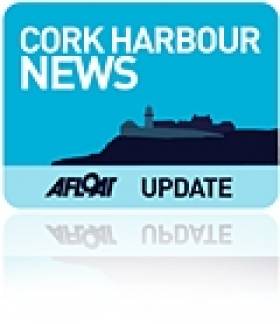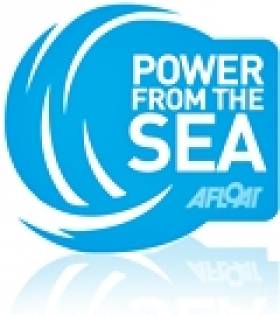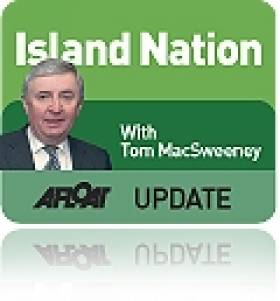Displaying items by tag: National Maritime College
Cormac Gebruers has been appointed to the post of Head of College at the National Maritime College of Ireland.
Cormac began his career as a deck officer in the merchant navy, graduating from Cork RTC (subsequently CIT) in 1993. He completed a BSc (Hons) in Computer Science programme in UCC. After a period working as Chief Technical Officer and as a director with an early Cork RTC spin-out company, he spent four years in computer science research in Science Foundation Ireland's first major centre, the Cork Constraint Computation Centre. Before joining the NMCI in 2012 as its Research & Innovation Manager, Cormac spent seven years with Transas, a multinational organisation focussed on maritime navigation systems, where he held the post of Deputy Unit Director. In this role, he worked extensively around the world, spending a one-year period in China. Cormac represented Transas at the International Maritime Organisation and on United States Coast Guard technical committees.
In addition to his work at the NMCI, Cormac is also a member of the CIT Research Ethics Committee and the CIT School of Graduate Studies Steering Committee, and he is involved with the Athena Swan initiative. Cormac is CIT’s representative on the Marine Research Advisory Group and is a member of a team that represents Ireland at the European Waterborne Technology Platform and the European Technology Platform for Logistics. From 2012 until 2017, Cormac was a member of the Spike Island Steering Committee which supported the Island’s successful development into an international visitor attraction.
National Maritime College Sailing Third in Hydro's Cup
#NMCI – On the 14th April, a team from the National Maritime College of Ireland (NMCI) from Cork Harbour travelled to Le Havre in France to compete in the 'Hydro's Cup'. Invites are exclusively sent out to sea-farers or cadets training in the European maritime sector. This was the first time an Irish team has ever competed in the Hydro's Cup, and the Irish contingent were joined at the event by two UK teams and primarily French teams.
The first day in Le Havre began with training on the J80s which were supplied by the Société des Régates du Havre; the club had a sublime setup and all 15 J80s were in fantastic condition. The Irish team of five - Conor Haughton, Andy Verso, Rob Scandrett, Aaron Little and Audrius Kaminskas - had trained year round in 1720s based out of Harbowline, Co. Cork.
The NMCI's sailing club had been pushing hard to get a team to France for some time, and this year they managed to do so by overcoming some major hurdles. The driving forces behind the club this year were team members Verso and Haughton, who were extremely motivated to develop the club.
Initially conditions varied: sunny spells, no wind and the distinct smell of sun cream in the air triggered agitation amongst the group. Travelling all this way for no wind? Surely not. Thankfully, the forecast had in fact predicted plenty of wind and it certainly lived up to its billing!
Day 1: 20 – 25 knots from the north brought a big swell and some testing conditions, particularly on the kite hoists/drops. The NMCI boys started as they meant to go on by bringing in a 2nd place finish in Race 1. The leeward mark was the place to be with all 15 boats rounding within seconds of each other. Kaminskas and Little performed some legendary stuff on the bow, putting their bodies literally on the line (or water!). The next set of results followed the initial successful pattern with two 3rd place finishes and a 6th. Following the final race it became apparent why the team were sluggish; the upper rudder bracket had sheared on one side from the loads of the day's weather! Luckily the team didn't lose the rudder and it was fixed for the following days racing. Haughton drove the team very consistently and by the end of a thrilling day 1, NMCI SC were left sitting in 3rd place overall.
Day 2: It was touch and go in the morning as to whether racing would take place at all. 30+ knots from the same direction kicked up a real stink outside the safety of the harbour walls. Nonetheless, the fantastic Race Committee decided to head out and give it a go. The 'O' flag was flown from the committee boat disabling the fleet from using their kites down wind.
The team kept their consistency and performed well in the breezy conditions. Scandrett, Verso and Haughton proved to work well together at the back of the boat with some excellent team work and tactical decisions. Upwind, the two local French teams' boat speed just could not be matched but downwind their defending tactics were pushed hard! Happily the NMCI crew maintained their overall third position and a great night at the École Nationale Supérieure Maritime gala followed afterwards.
Energy Chief Challenges Ireland to Become Global Maritime Leader
#powerfromthesea – A large crowd of 130 people gathered at the National Maritime College of Ireland for the Annual IMERC Conference to discuss how disruptive innovation can help Ireland realise its ocean potential. A disruptive innovation is an innovation which disrupts, improves and replaces an existing product, process approach or idea over time in unexpected ways. IMERC, the Irish Maritime and Energy Resource Cluster, is a partnership between University College Cork, Cork Institute of Technology and the Irish Naval Services.
The government aims to increase turnover from the sea to €6.4 billion by 2030. Chris Roche, the Chief Technical Officer (CTO) of EMC Europe, Middle East and Africa) EMEA Division, challenged the gathering to make the leap to disruptive innovation. He said "It is fantastic to see a cluster around such an obvious potential benefit to the country. The major question is if IMERC will move at enough speed and really embrace disruptive innovation?"
Mr Roche pointed out that Ireland is not among the top ten countries with the longest coastline in the world, nor is it among the largest Maritime and Energy clusters. To be successful Ireland will have to be innovative in its approach to building networks and take advantage of big data in the maritime sector.
"While Ireland is not among the countries with the longest coastlines, it does have the largest maritime to land mass area in the EU and is the third largest territory in the EU when its seabed is included which means that the maritime sector has huge growth possibilities for the Irish economy."
Dallas Meggitt CEO of Sound and Sea Technology also spoke at the conference. Last week Sound and Sea Technology announced the creation of 55 new jobs to be located on the IMERC campus. This conference made tangible contribution to the realisation of Ireland's ocean potential by bringing together speakers and guests from North America and Europe from a range of backgrounds including industry, government and academia to discuss the role disruptive innovation can play in driving this sector. IMERC is already making a big contribution to this sector with advanced plans for the development of a research and commercial campus in Ringaskiddy.
How Many Times Do I Have to Say the Sea is Vital to Ireland?
Ireland has the largest maritime area-to-land mass in the European Union, but derives only 1% of GDP from the maritime sector. At a time when the economy needs every benefit it can get this figure is startling, particularly when compared to countries with other extensive coastlines, such as Norway where the figure is 20%, Denmark where it is 11% and even the UK which has increased its figure to 5%.
Despite being an island nation with a strong dependency on the sea, the Irish maritime economy is still in its infancy, both in terms of investment and of recognition.
Once again the importance of the sea was shown in the pre-Christmas weather problems. When air transport again failed the public, the ferries continued to operate. When road transport needed salt for gritting to keep roads open, it was ships which brought the salt to Ireland.
How many times do I have to challenge the ignorance and stupidity of the State, of Government, towards the sea? How many times do I have to remind the public of how dependent we are on the sea as an island nation?
Though still considered a low priority by Government, the maritime sector is worth €3 billion to the nation and supports 440,000 direct and indirect jobs. According to the Marine Institute in the "SeaChange Programme," this could be increased by at least 50%.
In Cork the Coastal and Marine Resources Centre which is part of UCC's Environmental Research Institute and has been working out of the Naval Base on Haulbowline Island has changed its name and is planning to move to a new maritime research facility. It has become the "Coastal and Marine Research Centre".
For over ten years the CMRC has been promoting the use of integrated coastal zone management as a means of achieving sustainable development in the use of coastal and marine resources, including marine ecology, seabed mapping, coastal processes, remote sensing, geology and geomatics.
A new maritime research facility is planned at Ringaskiddy, adjacent to the National Maritime College, part of the announced intention to establish a Maritime and Energy Research Campus and Commercial Cluster. The Department of Communications, Energy and Natural Resources, Bord Gais and the UCC Glucksman Foundation contributed funding, together with €7.5m. from the Higher Education Authority. As part of the National Ocean Energy Strategy, it will "bring together on one site the people, their ideas and the infrastructure to support the development of ocean energy," according to MERC Chairman, Peter Coyle. "Our aim is to produce innovative technical solutions to support the development of the Irish maritime sector."
This will include ocean energy opportunities, such as wave power where Irish companies have been leading the way. Shipping, logistics and maritime transport, marine recreation, maritime security research and maritime space applications are amongst other aspects of research work to be undertaken in Ringaskiddy.
Valerie Cummins, who led the Coastal Marine Resources Centre over past years has been appointed Director of MERC and is being replaced as Director at the newly re-named Coastal and Marine Research Centre by Jeremy Gault.
This article is reprinted by permission of the EVENING ECHO newspaper, Cork, where Tom MacSweeney writes maritime columns twice weekly. Evening Echo website: www.eecho.ie































































